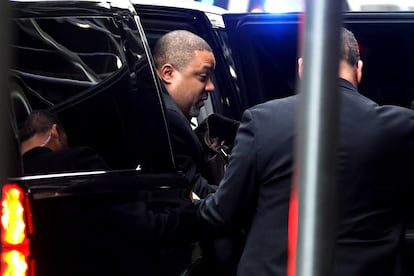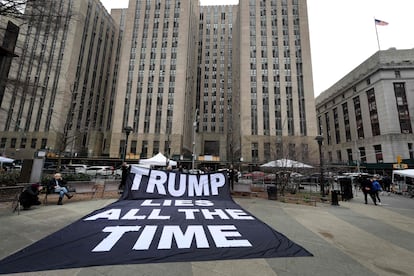Trump’s possible indictment changes the script of American politics
The Stormy Daniels case shows the enormous influence that the former president still has over the Republican Party, as well as the public discourse in the United States. The decision regarding his indictment is expected in the coming days

In the tragicomic theater of Donald Trump’s pending court cases, the past week seemed like a performance of Waiting for Godot.
Trump warned that, on Tuesday, he would be arrested, due to an alleged 2016 payment that was made to porn actress Stormy Daniels, in order to keep her quiet about an alleged extramarital affair that the former president denies. But on Tuesday, there was no arrest. Neither on Wednesday, nor Thursday.
Each one of those days ended with a version of Samuel Beckett’s line from his famous play: “Mr. Godot told me to tell you he won’t come this evening but surely tomorrow.”
On Monday, a meeting of the grand jury is likely to be called to decide if — for the first time in history — a former U.S. president will be indicted. Manhattan District Attorney Alvin Bragg — a Democrat — would be the man to prosecute him if this is the case.
An indictment would mean Trump would have to appear before a judge in Manhattan and get a mugshot taken. He would be read his rights and would have to listen — cuffed or uncuffed — to the charges being filed against him.
Buying someone’s silence is not a crime in America. In fact, it’s “very ordinary in modern America,” according to the Fox New host Tucker Carlson. However, falsifying documents to disguise a payment to his then-attorney Michael Cohen — who, in 2018, confessed to giving Daniels $130,000 — is a misdemeanor, punishable by up to one year in prison. However, this becomes a felony — punishable by up to four years in prison — if it is proven that the operation was instrumental in the commission of another crime, such as the irregular financing of an electoral campaign, or conspiracy to influence or prevent a vote.
While the legal details are being clarified, Trump has, once again, demonstrated his inimitable ability to change the American political, judicial and media script. This, after many had already accepted the news of his public death.
Nowhere has Trump’s power become more evident than within the Republican Party. Just as a part of the right was toying (again) with the idea of turning the page on the Trump era, a group of congressmen has demanded that DA Bragg appear in the House of Representatives to clarify his “political agenda.” The New York prosecutor responded with a stern letter, asking the legislators not to interfere in the independent judicial process.
The hardest wing of the GOP has long since embraced the unapologetic accusation that the Biden government has instrumentalized the judiciary for its benefit. And the tycoon has also forced his rivals — such as former vice president Mike Pence — into embarrassing contortions to come to his defense.

Pence and Florida Governor Ron DeSantis — possible competitors in the 2024 Republican presidential primaries — have both rejected the accusations against the former president, even as they weigh challenges against him.
The latest legal troubles have forced DeSantis — who is pushing a relentless ultra-conservative agenda in his state — to support Trump, fearful of losing the party’s base. But while he has defended the president in his legal fight, he used an interview with Piers Morgan on Wednesday, March 22, to criticize Trump’s chaotic leadership style and his handling of the pandemic.
DeSantis said that the Founding Fathers would never have slept with a porn actress, adding that he practices a “no daily drama” management style and that “he kind of” likes the nickname given to him by the tycoon: Ron DeSanctimonius. This is because “it’s long, it’s got a lot of vowels” and because people can call whatever they want, as long as they consider him to be “a winner.”
Those words — and not-so-subtle hints — put the governor at the top of Trump’s list of enemies, along with Bragg, billionaire George Soros, Michael Cohen and President Biden. Trump has used his social media network, Truth Social, to go after all of these men, flooding the site with attacks. DeSantis has been able to see what previous rivals of the former president know very well: there are few fighters harder to knock out than Trump.
“The consequences that all this can have in the [political] game are difficult to predict, because it’s unprecedented. I think the Republicans will support Trump in the short-term, but I don’t know how long that will last,” explained conservative analyst Matthew Continetti to EL PAÍS via email on Friday, March 24.
“Whatever happens, the polls have once again shown that [Trump] is still preferred by the base for the presidential nomination.” According to the polling average provided by RealClearPolitics, Trump leads DeSantis by 15 points (44.4% to 29.1%).
Trump has done more than make it clear that he’s the frontrunner. In the days preceding his possible indictment, he posted social media messages claiming — without evidence — that he would be arrested on Tuesday. He also demanded that his supporters “protest” to “take back the country,” warning of “death and destruction” if he were to be charged. He also took the opportunity to send out fundraising emails.
Washington’s political circles are now divided between those who believe that all this will spur Trump’s presidential aspirations and those who believe otherwise.
“Since he came out of nowhere in 2016, we still fear underestimating his ability to get up from the mat, despite all the elections he has lost by big margins [two midterms and one presidential election],” warned presidential historian Russell Riley in an interview with EL PAÍS.

“But I don’t think it can be good for a candidate to be embroiled in legal trouble, for there to be questions about whether he supports violence, or about his behavior with a porn star who was then paid to keep quiet. Trump has secured the support of 35% of the U.S. population. I don’t think all those things are accepted by the 15% who he needs to convince in order to win.”
Riley is co-director of the Miller Center’s Oral History Program at the University of Virginia in Charlottesville, an institution that hopes, in the future, to conduct interviews about the Trump White House, as it did with the administrations of Jimmy Carter, Bill Clinton and the Bushes.
In a conversation with this newspaper, he pointed out that “within this unprecedented mess, there is one point that people miss” — that it’s possible to run for the presidency from jail.
“It happened in 1920, when Eugene Debs was a candidate for the Socialist Party of America while serving prison time for violating the Espionage Act of 1917 [for making speeches critical of the role of the United States in World War I].” Debs, however, only got a million votes.
Kevin O’Brien — who served as an assistant U.S. attorney at the Justice Department under Reagan — believes that there’s only a very narrow path to be able to halt Trump’s presidential aspirations:
“One of the amendments to the Constitution from the Civil War era prohibits someone guilty of insurrection from holding federal office,” the lawyer explained this past week in a telephone interview. “It was designed for the Confederate rebels. The interesting question is whether that exception could be applied to Trump for the attack on the Capitol.”
Trump’s responsibility for the events of January 6, 2021 is another pending case. Meanwhile, in Atlanta, another grand jury is investigating his alleged attempt to influence Republican officials to reverse the result of the 2020 presidential election in Georgia. Trump is also being investigated for taking hundreds of classified documents from the White House to his Mar-a-Lago residence in Florida after leaving office. In addition to all of this, there are multiple civil lawsuits against the Trump Organization in New York.
In the Stormy Daniels case, Trump’s management of the crisis has proven effective in putting enormous pressure on Bragg and the 23-member grand jury, whose decisions and adjournments now appear to be targets of Trump’s influence.
“To venture that he would be arrested or charged on Tuesday was a master stroke,” O’Brien said. “Since it didn’t happen, it gave the impression that chaos had taken over the process, when [he had] simply invented that [the arrest] would take place that day.”
“I’m not sure that there’s anything unusual going on in that courthouse. If you take false expectations out of the equation, delays are part of normal grand jury life,” he added.
The lawyer has no doubt that Trump will be indicted. His bet is that it will happen in the coming days. Conservative columnist Peggy Noonan has pointed out that what is happening to Trump is what happened to Al Capone, who ended up being busted for evading taxes.
To the question of whether it’s a good idea for Trump to end up being charged in the weakest of the cases he is facing, O’Brien replied: “It must be taken into account that, in our system, there is no coordination between the courts, which act independently. Nobody orders the [indictments]. Not only that: to a certain extent, [the different courts] compete. And some prosecutors are itching to see who gets there first.”
“I’m not saying that this is what’s happening, only that it happens. These [prosecutors] are elected officials and sometimes they have to impress their constituencies. I agree that it would have been better if this whole thing had been carried out behind closed doors — not in the public eye — but it is what it is. And it’s already too late for Bragg, who also joined the ongoing case when he came to office [in 2021]. I don’t think he can backtrack.”
Nor does it appear that Trump intends to back down. On Saturday, he held a campaign rally in Waco, Texas, where, 30 years ago, the leader of a sect — David Koresh — faced the government for 51 days in a bloody siege, which was broadcast live across the world. The rally showed that, far from the New York courts and DC offices, the former president still has a loyal fan base that is quite similar to a cult.
Sign up for our weekly newsletter to get more English-language news coverage from EL PAÍS USA Edition
Tu suscripción se está usando en otro dispositivo
¿Quieres añadir otro usuario a tu suscripción?
Si continúas leyendo en este dispositivo, no se podrá leer en el otro.
FlechaTu suscripción se está usando en otro dispositivo y solo puedes acceder a EL PAÍS desde un dispositivo a la vez.
Si quieres compartir tu cuenta, cambia tu suscripción a la modalidad Premium, así podrás añadir otro usuario. Cada uno accederá con su propia cuenta de email, lo que os permitirá personalizar vuestra experiencia en EL PAÍS.
¿Tienes una suscripción de empresa? Accede aquí para contratar más cuentas.
En el caso de no saber quién está usando tu cuenta, te recomendamos cambiar tu contraseña aquí.
Si decides continuar compartiendo tu cuenta, este mensaje se mostrará en tu dispositivo y en el de la otra persona que está usando tu cuenta de forma indefinida, afectando a tu experiencia de lectura. Puedes consultar aquí los términos y condiciones de la suscripción digital.








































